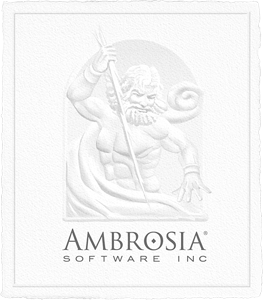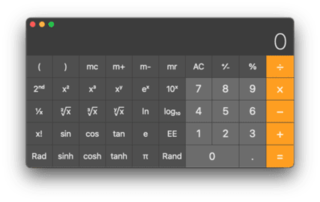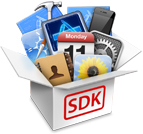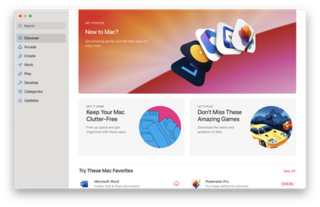
macOS, originally Mac OS X, previously shortened as OS X, is an operating system developed and marketed by Apple since 2001. It is the primary operating system for Apple's Mac computers. Within the market of desktop and laptop computers, it is the second most widely used desktop OS, after Microsoft Windows and ahead of all Linux distributions, including ChromeOS.
Macworld/iWorld was an information technology trade show with conference tracks dedicated to Apple's Mac platform. It was held annually in the United States during January. Originally Macworld Expo and then Macworld Conference & Exposition, the gathering dates back to 1985. The conference was organized by International Data Group (IDG), co-publisher of Macworld magazine.

Ambrosia Software was a predominantly Macintosh software and gaming company founded in 1993 and located in Rochester, New York, U.S. Ambrosia Software was best known for its Macintosh remakes of older arcade games, which began with a 1992 version of Atari, Inc.'s Asteroids from 1979. The company also published utility software. Its products were distributed as shareware; demo versions could be downloaded and used for up to 30 days. Later the company released some products for iOS. Ambrosia's best-selling program was the utility Snapz Pro X, according to a 2002 interview with company president Andrew Welch.
The Worldwide Developers Conference (WWDC) is an information technology conference held annually by Apple Inc. The conference is usually held at Apple Park in California. The event is usually used to showcase new software and technologies in the macOS, iOS, iPadOS, watchOS, tvOS, and visionOS families as well as other Apple software; new hardware products are sometimes announced as well. WWDC is also an event hosted for third-party software developers that work on apps for iPhones, iPads, Macs, and other Apple devices. Attendees can participate in hands-on labs with Apple engineers and attend in-depth sessions covering a wide variety of topics.

Mac OS X Public Beta was the first publicly available version of Apple Computer's Mac OS X operating system to feature the Aqua user interface. It was released to the public on September 13, 2000 for US$ 29.95. Its release was significant as the first publicly available evidence of Apple's ability to ship the "next-generation Mac operating system" after the Copland failure. It allowed software developers and early adopters to test a preview of the upcoming operating system and develop software for it before its final release. It is the only public version of Mac OS X to have a code name not based on a big cat until the release of 10.9 Mavericks in 2013. The US version had a build number of 1H39 and the international version had build number 2E14.

Stevenote is a colloquial term for keynote speeches given by Steve Jobs, former CEO of Apple, at events such as the Apple Worldwide Developers Conference, Macworld Expo, and Apple Expo. Because most Apple product releases were first shown to the public at these keynotes, "Stevenotes" caused substantial swings in Apple's stock price.

Rogue Amoeba Software, Inc. is a software company that produces audio software, specializing in applications for audio capture for the Macintosh platform. Rogue Amoeba's best-known products are Audio Hijack and Audio Hijack Pro. The Audio Hijack programs allow for users to capture and record audio from any program running under macOS. The Pro version adds support for VST, Audio Unit, and LADSPA plugins, among other features.

Rhapsody is an operating system that was developed by Apple Computer after its purchase of NeXT in the late 1990s. It is the fifth major release of the Mach-based operating system that was developed at NeXT in the late 1980s, previously called OPENSTEP and NEXTSTEP. Rhapsody was targeted to developers for a transition period between the Classic Mac OS and Mac OS X. Rhapsody represented a new and exploratory strategy for Apple, more than an operating system, and runs on x86-based PCs and on Power Macintosh.
Tidbits is an electronic newsletter and web site dealing primarily with Apple Inc. and Macintosh-related topics.
SoundJam MP is a discontinued MP3 player for classic Mac OS-compatible computers and Rio-compatible hardware synchronization manager that was released in July 1999 and was available until June 2001. Jeff Robbin and Bill Kincaid developed SoundJam MP with assistance from Dave Heller. Robbin and Kincaid chose Casady & Greene to publish SoundJam MP. Apple, Inc. purchased SoundJam MP in 2000 and further developed the code to create iTunes version 1.0. Casady and Greene ceased publication of SoundJam MP in June 2001 at the request of the developers.
Juice is a podcast aggregator for Windows and OS X used for downloading media files such as ogg and mp3 for playback on the computer or for copying to a digital audio player. Juice lets a user schedule downloading of specific podcasts, and will notify the user when a new show is available. It is free software available under the GNU General Public License. The project is hosted at SourceForge. Formerly known as iPodder and later as iPodder Lemon, the software's name was changed to Juice in November 2005 in the face of legal pressure from Apple, Inc.

Calculator is a basic calculator application made by Apple Inc. and bundled with its macOS, iOS, iPadOS, and watchOS operating systems. It has three modes: basic, scientific, and programmer. The basic mode includes a number pad, buttons for adding, subtracting, multiplying, and dividing, as well as memory keys. Scientific mode supports exponents and trigonometric functions. The macOS version of Calculator also has a programmer mode that gives the user access to more options related to computer programming.

The iOS SDK, formerly the iPhone SDK, is a software development kit (SDK) developed by Apple Inc. The kit allows for the development of mobile apps on Apple's iOS and iPadOS operating systems.
Mac operating systems were developed by Apple Inc. in a succession of two major series.

The Mac App Store is a digital distribution platform for macOS apps, often referred to as Mac apps, created and maintained by Apple Inc. The platform was announced on October 20, 2010, at Apple's "Back to the Mac" event. Apple began accepting app submissions from registered developers on November 3, 2010, in preparation for its launch.
The following outline of Apple Inc. is a topical guide to the products, history, retail stores, corporate acquisitions, and personnel under the purview of the American multinational corporation:

Mac OS is the series of operating systems developed for the Macintosh family of personal computers by Apple Computer, Inc. from 1984 to 2001, starting with System 1 and ending with Mac OS 9. The Macintosh operating system is credited with having popularized the graphical user interface concept. It was included with every Macintosh that was sold during the era in which it was developed, and many updates to the system software were done in conjunction with the introduction of new Macintosh systems.

macOS Sierra is the thirteenth major release of macOS, Apple Inc.'s desktop and server operating system for Macintosh computers. The name "macOS" stems from the intention to unify the operating system's name with that of iOS, watchOS and tvOS. Sierra is named after the Sierra Nevada mountain range in California and Nevada. Specifically, Lone Pine Peak is the location for macOS Sierra's default wallpaper. Its major new features concern Continuity, iCloud, and windowing, as well as support for Apple Pay and Siri.











